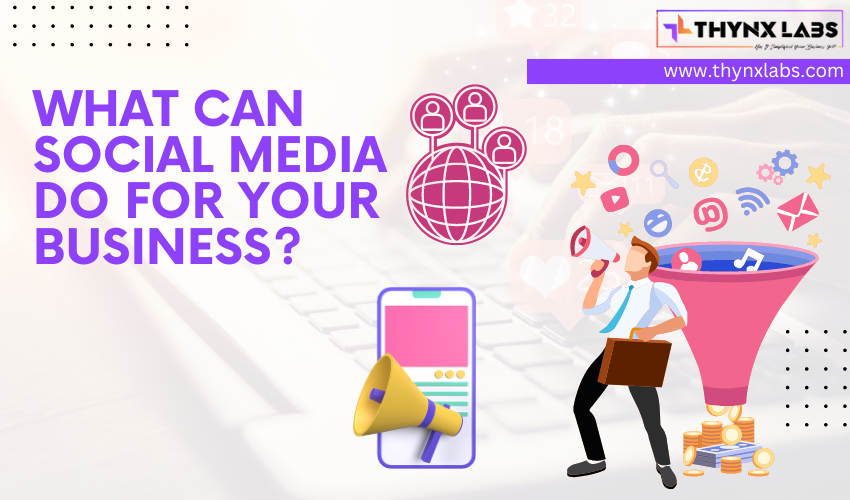How Social Media Can Help You To Grow Your Business?
Social media has become an essential part of our daily lives, and it's no longer just a tool for socializing with friends and family. Social media has become a powerful marketing tool, and it can help businesses grow in numerous ways. With billions of people using social media platforms such as Facebook, Twitter, Instagram, and LinkedIn, it's important for businesses to have a strong social media presence. In this article, we'll explore the ways social media can help businesses grow and succeed.
1. Increased Visibility and Brand Awareness
Social media platforms provide an easy and inexpensive way to increase your brand's visibility and awareness. By creating social media profiles for your business, you can easily reach potential customers, engage with your existing customers, and build a following. Social media platforms allow you to share your content, products, and services with a wide audience, increasing the chances of people discovering your business.
2. Improved Customer Engagement
Social media provides businesses with a direct line of communication with their customers. It allows businesses to engage with customers, answer their questions, address their concerns, and receive feedback. This direct communication can help build trust and loyalty with your customers, making them more likely to become repeat customers and recommend your business to others.
3. Targeted Advertising
Social media platforms allow businesses to create targeted advertising campaigns, reaching potential customers who are most likely to be interested in their products or services. Targeted advertising allows businesses to reach specific demographics, interests, behaviors, and locations. This can help businesses save money on advertising costs while increasing their return on investment.
4. Increased Website Traffic
Social media can drive traffic to your website by providing links to your website in your social media posts. By creating engaging content and using effective call-to-actions, businesses can encourage their social media followers to visit their websites. This can increase website traffic, improve search engine optimization, and ultimately lead to more conversions.
5. Enhanced Customer Insights
Social media provides businesses with valuable customer insights that can be used to improve their products, services, and marketing strategies. By analyzing social media data, businesses can gain insights into customer preferences, behavior, and feedback. This can help businesses make data-driven decisions and improve their overall customer experience.
6. Increased Sales and Revenue
Social media can help businesses increase their sales and revenue by providing a platform to showcase their products and services, engage with potential customers, and drive traffic to their websites. By building a strong social media presence, businesses can increase their brand awareness, customer engagement, and customer loyalty, ultimately leading to more sales and revenue.
7. Competitive Advantage
Social media can provide businesses with a competitive advantage by allowing them to stay ahead of their competitors. By analyzing competitors' social media strategies, businesses can identify areas for improvement and develop more effective strategies. Additionally, businesses can monitor industry trends and keep up-to-date with the latest marketing techniques, giving them an edge over their competitors.
Tips for Using Social Media to Grow Your Business
Now that we've discussed the benefits of social media for businesses, let's look at some tips for using social media to grow your business.
· Define Your Social Media Strategy
Before you start using social media for your business, it's important to define your social media strategy. This includes determining your target audience, social media goals, content strategy, and key performance indicators. By having a clear social media strategy, you can ensure that your social media efforts are aligned with your business objectives.
· Use Multiple Social Media Platforms
While it's important to focus on the social media platforms that are most relevant to your target audience, it's also important to use multiple social media platforms. By having a presence on multiple platforms, you can reach a wider audience and increase your brand visibility.
· Create Engaging Content
Creating engaging content is essential for building a strong social media presence. You should aim to create content that is interesting, informative, and relevant to your target audience. This can include blog posts, videos, images, and infographics. Additionally, you should vary your content formats to keep your audience engaged and interested.
· Engage with Your Audience
Engaging with your audience is crucial for building a strong social media presence. You should aim to respond to comments, answer questions, and address concerns in a timely manner. Additionally, you should encourage user-generated content by asking your audience to share their experiences with your products or services.
· Use Hashtags
Using hashtags is an effective way to increase your social media reach and visibility. You should research relevant hashtags for your business and incorporate them into your social media posts. Additionally, you can create your own branded hashtag to encourage user-generated content and increase brand awareness.
· Monitor Analytics
Monitoring your social media analytics is important for understanding the effectiveness of your social media efforts. You should regularly review your social media metrics, including engagement rates, reach, and conversions. This can help you identify areas for improvement and adjust your social media strategy accordingly.
· Stay Up-to-Date with Trends
Social media trends are constantly evolving, and it's important to stay up-to-date with the latest trends and techniques. You should regularly research industry trends and follow thought leaders in your industry. Additionally, you should experiment with new social media features and tools to keep your social media strategy fresh and effective.
Conclusion
Social media has become an essential tool for businesses looking to grow and succeed. By building a strong social media presence, businesses can increase their brand visibility, customer engagement, website traffic, and sales and revenue. However, it's important to have a clear social media strategy, create engaging content, engage with your audience, use hashtags, monitor analytics, and stay up-to-date with trends. By following these tips, businesses can effectively use social media to grow their business and achieve their marketing goals.
FAQ's
Q.1 How can social media help small businesses?
Social media can help small businesses by providing an easy and inexpensive way to increase their brand visibility, engage with customers, drive website traffic, and increase sales and revenue. Social media can also provide valuable customer insights and help businesses stay competitive in their industry.
Q.2 Which social media platforms are best for business?
The best social media platforms for businesses depend on the business's target audience and industry. However, some popular social media platforms for business include Facebook, Twitter, Instagram, LinkedIn, and YouTube.
Q.3 How often should businesses post on social media?
The frequency of social media posting depends on the social media platform and the business's audience. Generally, businesses should aim to post at least once a day on Facebook and Instagram, several times a day on Twitter, and a few times a week on LinkedIn and YouTube.
Q.4 What type of content should businesses post on social media?
Businesses should aim to create engaging and relevant content that is tailored to their target audience. This can include blog posts, videos, images, infographics, and user-generated content.
Q.5 How can businesses measure the effectiveness of their social media efforts?
Businesses can measure the effectiveness of their social media efforts by monitoring social media metrics, including engagement rates, reach, and conversions. Additionally, businesses can use social media listening tools to monitor brand mentions and sentiment.


